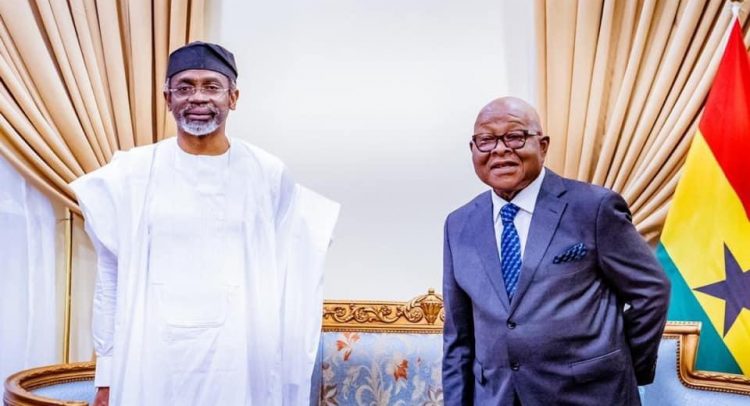Olufemi Gbajabiamila and Prof. Mike Oquaye (R) in a discussion
SPEAKER of the Nigerian House of Representatives, Olufemi Gbajabiamila, has asked Ghana and Nigeria to use legislative diplomacy to resolve the economic and trade issues confronting them.
According to him, both countries are bound by economic, social and political ties that should not be eroded by the implementation of a law that will render Nigerian traders in Ghana jobless.
He was speaking at a roundtable discussion with the Speaker of Parliament, Prof. Mike Oquaye; the Minister of Trade and Industry, Alan Kwadwo Kyerematen; the Minister for National Security, Albert Kan Dapaa; and the Chief Executive Officer of the Ghana Investment Promotion Centre (GIPC), Yofi Grant.
The meeting was also attended by the Chairman of the Parliamentary Committee on Foreign Affairs, Frank Annoh-Donpreh and the Deputy Ranking Member, Vanderpuije Alfred Oko, as well as some Nigerian delegations.
The discussions were centred on how the implementation of Act 865 could be implemented in a way that would not adversely affect Nigerian traders in Ghana.
Some Nigerian traders say their shops have been closed and fines imposed on them in accordance with the provisions of GIPC Act 865.
Ghana’s sovereignty and national interest has been at the front burner with members of the Ghana Union of Traders Association (GUTA) complaining of the takeover of the retail market by Nigerian traders.
The Nigerian Speaker, Gbajabiamila, wants Speaker Oquaye to work together with him, as they previously did, using diplomacy as the tool in resolving economic issues not only between Ghana and Nigeria, but in the sub region.
Mr. Kyeremanten schooled the Nigerian Speaker and his delegation on the operation of the GIPC Act.
According to him, Nigerian nationals are not targeted by the implementation of the Act and outlined ways by which the two countries could have mutual trade relations with the requisite benefits.
Prof. Oquaye noted that reports on the matter had escalated tensions and cautioned people not to confuse private or commercial arrangements between individuals and organizations of both countries with governmental engagements.
He also encouraged the use of diplomacy in finding a lasting solution to the problem and said that both countries were keen on this.
By Ernest Kofi Adu, Parliament House


